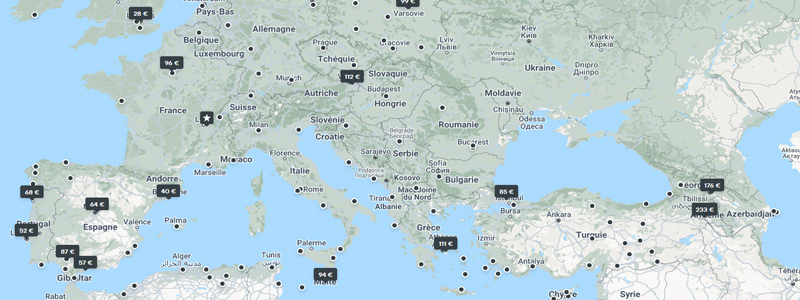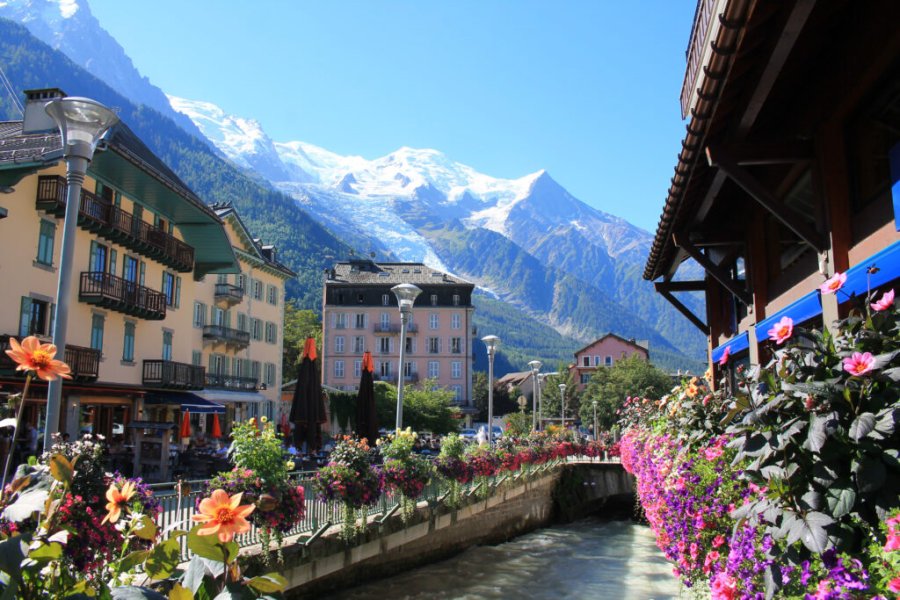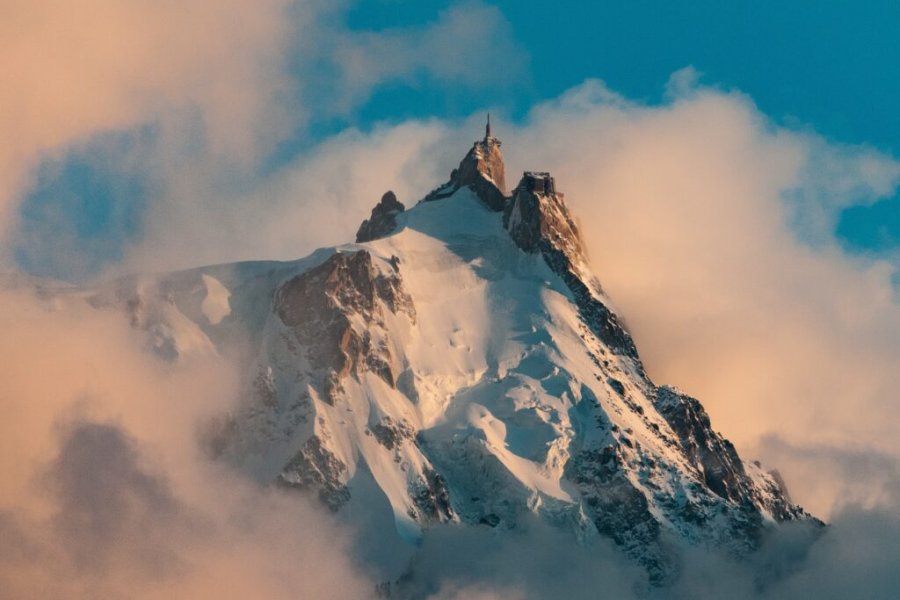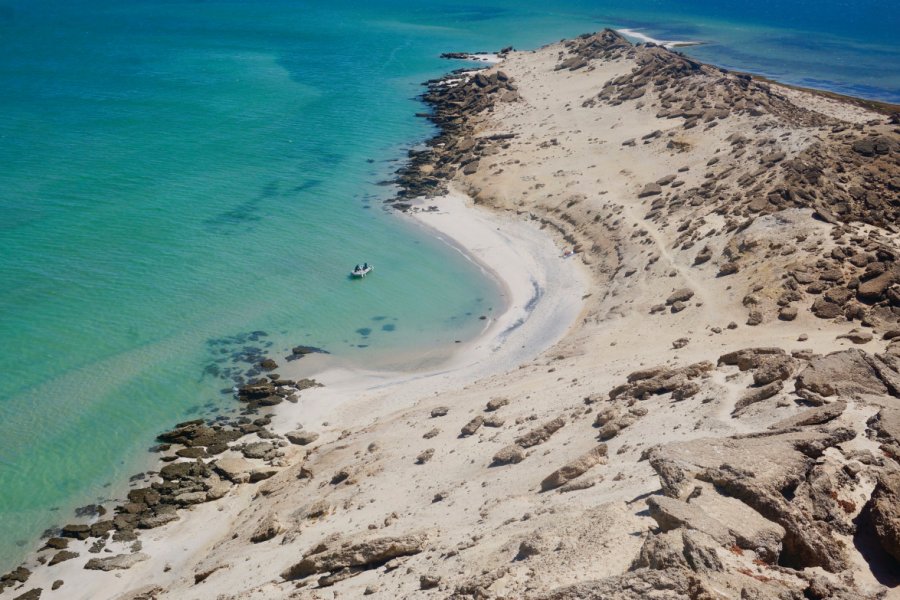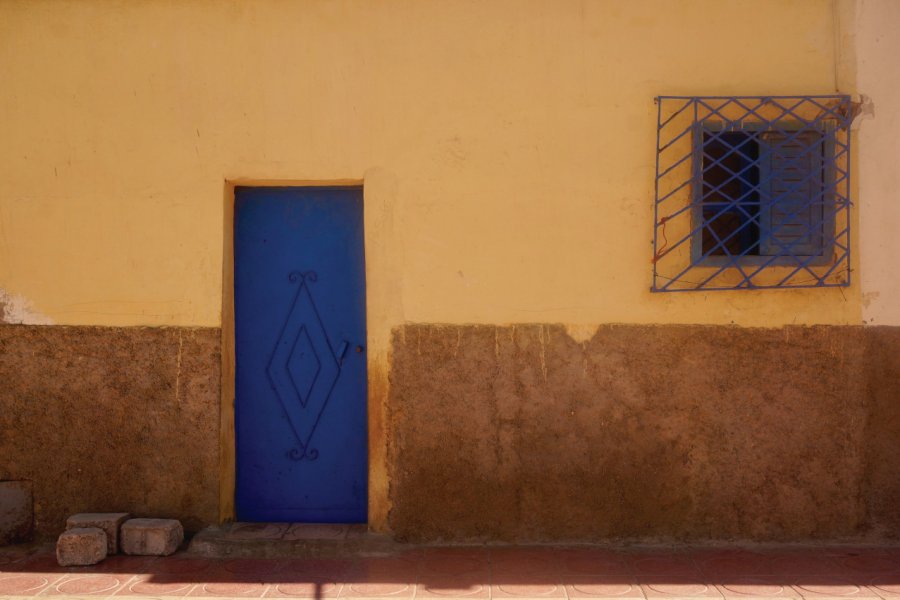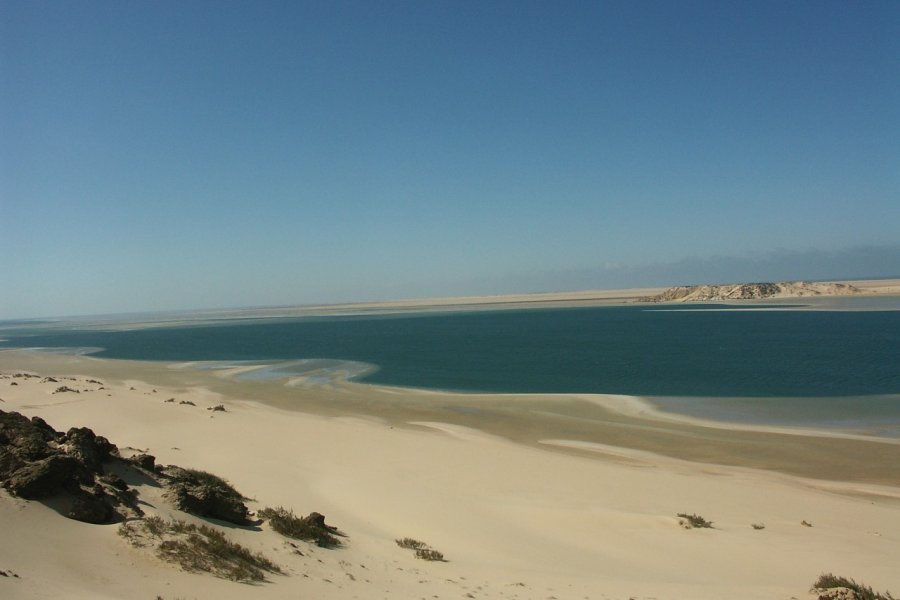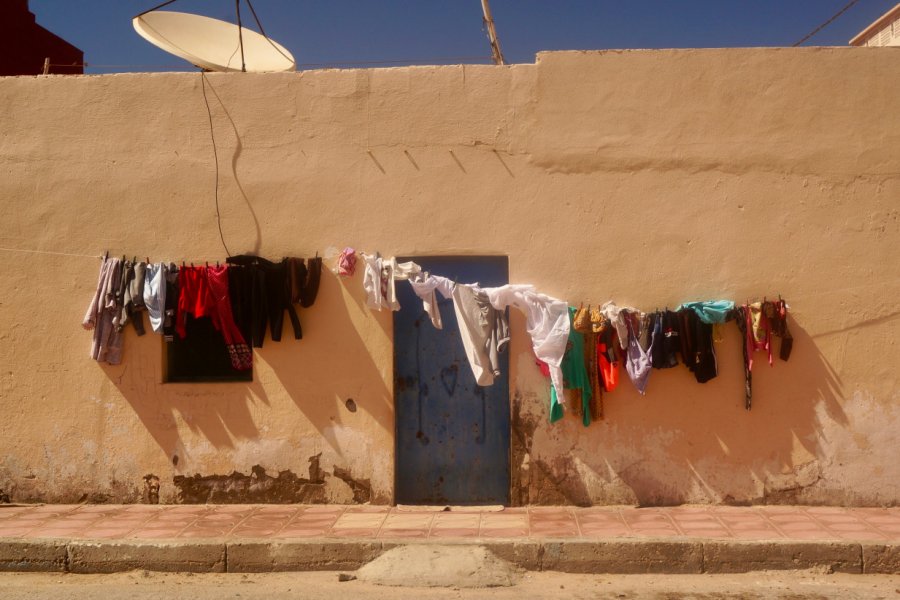Travel Guide Dakhla
Fascinating encounter between ocean and desert, people and travelers, Dakhla will enchant you. This city-peninsula, nestled in Western Sahara, reveals its magic at the southernmost tip of Morocco. The magnificent 37 km-long Dakhla Bay lies between the mainland and the peninsula. It is internationally renowned for its biodiversity. Named Villa Cisneros by Spanish settlers in 1884, it stands proudly 30 km north of the Tropic of Cancer, evoking places as far away as Havana and Hawaii. A cradle of cultures thousands of years old, Dakhla has preserved a rare authenticity, while opening up to the world's influences. With the Dahkla Tourist Guide, discover the most beautiful accommodations and sites not to be missed.
Although its history has been marked by territorial disputes and complex colonization, Dakhla's timeless charm remains. The Spanish and then the Moroccans shaped its heritage, but it was the original inhabitants - fishermen and Saharan tribes - who gave the region its soul. Today, Dakhla Bay, internationally renowned for its beauty and eco-friendly activities, attracts a multitude of visitors. The site's charm is undeniable.
At low tide, the bay comes alive with walkers, dreamers, fishermen and, above all, kitesurfers. Surf camps such as the pioneering Dakhla Attitude and Auberge des Nomades du Sahara bear witness to the growing popularity of kitesurfing. Herné Island, also known as Dragon Island, is a jewel accessible at low tide. PK25, a meeting point for motorhomes, offers a breathtaking view of the bay and its warm, sulfurous waters. Curiosity may lead the more adventurous to the White Dune, an unspoilt area 50 km from the city, or to the beaches of Puerto Rico, 80 km to the south. These destinations recall the majestic power of the Sahara.
Immerse yourself in the heart of Dakhla: strolling through the narrow streets of the old town is a plunge into history, where the tales of the elders mingle with the laughter of children playing in the streets. The local market, teeming with life, offers a palette of flavors and aromas, reflecting the generosity of Saharan cuisine, to be sampled in the best restaurants in the area!
But to capture the essence of Dakhla, you need to get away from it all. Whether it's the wild beach ofOum Labouir, the fishing village of Lassarga or the mystical white dune, every corner offers a unique experience. For adventure seekers, the dunes of the Sahara offer an unforgettable experience. Whether by camel, 4 x 4 or on foot, every dune climbed offers a breathtaking panorama.
Dakhla is a destination that promises to gently disorientate, delight and enchant - you'll never want to leave.
When to go to Dakhla?
When to go to Dakhla? This unique site where the Sahara caresses the Atlantic invites you to a memorable experience all year round:
November to March: the coolness of the desert combines with the mildness of the coast to offer a temperate climate. If you go to Dakhla in December, you'll enjoy mild temperatures, ideal for exploring the dunes and enjoying long walks on the beach. Accommodation prices tend to be higher during this period, not least due to the presence of campervanners who make the bay their home.
April to June: between land and sea, spring is a great time to discover Dakhla. The excitement of summer is not yet here, but the climate is pleasant. In April, the town is bathed in golden light and water sports activities take off.
From July to September: the call of the kitesurfer, as the winds are strong and constant, attracting kitesurfers from all over the world. If you go to Dakhla in August, you'll witness a bay transformed by the colorful sails of the riders. Expect prices to rise during this peak season.
October to November: Dakhla is back to its peaceful self, the ideal time to recharge your batteries.
So, when to go to Dakhla ? It all depends on your preferences: fishing, kitesurfing or simply total disconnection, each season offers its own opportunities.
Weather at the moment
Head for the ocean desert! Throughout the year, the weather in Dakhla is mostly mild, alternating between the cool of the sea and the heat of the desert.
Summer in Dakhla corresponds to the high season: temperatures rise, but remain moderate thanks to the ocean breezes. Kitesurfers flock to this destination during these months to take advantage of the constant winds. In July, the temperature in Dakhla is often ideal for water sports.
The mild winter months from November to March offer a refreshing break. Although the Sahara experiences chilly nights, the proximity of the ocean softens these thermal drops, making for pleasantly cool evenings.
Just pack a little wool for winter evenings, and you're ready for adventure!
Dakhla budget: this destination offers excellent value for money for travellers. The local currency, the Moroccan dirham, is subject to fluctuations, but don't worry, currency exchange is available at most hotels and local banks. Credit cards are accepted in most establishments. Gratuities are appreciated as a token of your satisfaction, especially in restaurants and cabs.
And don't forget that Dakhla is a backpacker's paradise! You'll find numerous inns and small local restaurants where you can enjoy the authentic experience without breaking the bank. For added convenience, many mid-range hotels and restaurants offer excellent comfort with a local touch. And for lovers of luxury? Dakhla is not to be outdone. A number of high-end establishments offer the Saharan experience with a touch of refinement.
When traveling to Morocco and Dakhla, a passport valid for the entire stay is essential. If your passport has expired or has been lost, you can renew it at the French Consulate General in Morocco. Organized tourist trips also require a passport. It is no longer possible to enter Morocco with just a national identity card. When you arrive, make sure your passport is properly stamped by the authorities. All non-residents must have a return ticket and proof of sufficient means of subsistence. If your stay exceeds three months, you will need to apply for an extension of your residence permit.
Minors must have a valid passport. Additional documents are recommended if the child is traveling with a single parent or a third party.
As far as customs are concerned, vehicle entry and exit is strictly controlled. A vehicle can obtain a temporary import authorization for 3 months, renewable once. Finally, the entry and use of drones is forbidden without prior authorization.
Whathealth precautions should I take in Dakhla? Before flying to Dakhla, it's a good idea to check that you're up to date with common vaccinations such as tetanus and yellow fever. Next, remember that Dakhla is characterized by its desert climate. Adequate hydration is therefore essential. Prefer bottled mineral water, and avoid tap water wherever possible. Lovers of fruit and vegetables should wash them carefully, ideally with purified water, to avoid any risk.
And, even if Dakhla has a few well-stocked pharmacies, take along a first-aid kit and travel insurance. Don't forget medication for headaches, intestinal problems or allergic reactions. With its bright sun, Dakhla can be merciless on the skin. High SPF sun cream, sunglasses and a hat are a must.
Practical information
- When to travel?
- Weather forecast
- Budget
- Formalities
- Health
- How to travel by yourself?
- How to get organized?
- Getting around
Media
How to go to Dakhla? Our advice & tips
If you're considering an organized trip to Dakhla, choose the right travel package:
Kitesurfing package : given Dakhla's popularity as a kitesurfing destination, many operators offer all-inclusive packages with lessons, accommodation and sometimes meals.
Relaxing stay : opt for a stay in one of Dakhla's ecolodges or resorts, offering stunning lagoon views, spa treatments and fine cuisine.
Discovery tour: encompass several facets of Dakhla, from desert excursions to a visit to the town itself.
Make sure the operator is credible and adheres to ethical and environmental standards, find out what's included in the package and enjoy the benefits of this type of turnkey excursion!
With its majestic lagoon, water sports and desert landscapes, Dakhla is a destination that appeals to many solo travelers. As with any destination, caution is advised, especially at night. Avoid isolated areas after dark, and keep your belongings safe.
Put your backpack down in hostels and riads, which often offer rooms shared with other adventurers. Dakhla also boasts several eco-lodges along the lagoon. It's a great way to connect with nature. If you've never tried kitesurfing, this is the perfect place to start. You can also try your hand at windsurfing, surfing or fishing. Then head off for a day or night in the desert. The locals are generally warm and welcoming. Don't hesitate to strike up a conversation, whether with a fisherman on the beach or a shopkeeper at the market. For digital nomads, most hotels and restaurants offer a WiFi connection.
To get around Dakhla and the surrounding area, car rental is particularly useful. You must have valid insurance. International driving licenses are accepted. Given the sometimes sandy roads, consider an off-road car. Cabs are plentiful in Dakhla, so be sure to arrange a fare in advance or check that the meter is running. If you wish to travel to neighboring or more distant regions, cabs can take you there for a fixed fare. Several establishments in Dakhla also offer bike and scooter rentals.
Precautions: wear a helmet, especially if you opt for a scooter. Be careful, as the wind in Dakhla can be powerful and destabilize your ride. Alternatively, there are minibuses and buses operating in Dakhla and to the surrounding villages. They are economical but can be less comfortable and less frequent.
Tip: as in many Moroccan cities, bargaining is common. Whether you need a cab or a rental car, don't hesitate to discuss the price.
